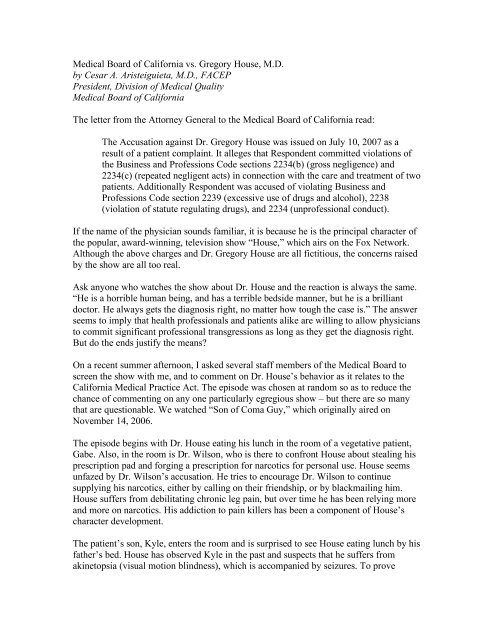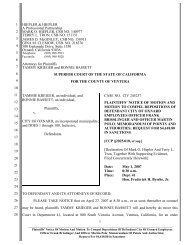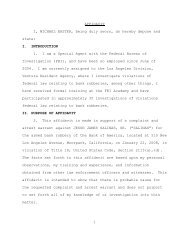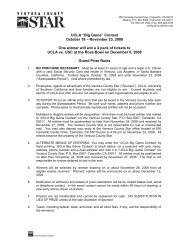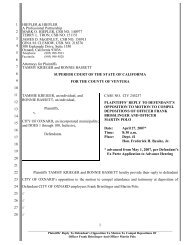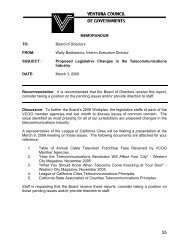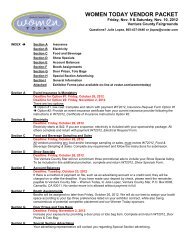Medical Board of California vs. Gregory House, M.D. by Cesar A ...
Medical Board of California vs. Gregory House, M.D. by Cesar A ...
Medical Board of California vs. Gregory House, M.D. by Cesar A ...
- No tags were found...
You also want an ePaper? Increase the reach of your titles
YUMPU automatically turns print PDFs into web optimized ePapers that Google loves.
himself right, Dr. <strong>House</strong> first throws a bag <strong>of</strong> chips at Kyle, which he fails to catch,striking him in the face. <strong>House</strong> then induces a seizure <strong>by</strong> flashing the room lights. Kylecollapses to the ground and begins convulsing violently. <strong>House</strong> makes no attempt toadminister aid to the now-seizing Kyle, and seems to take pleasure in proving himselfright once again. Prior to this encounter, <strong>House</strong> did not have a physician-patientrelationship with Kyle, and he never obtained consent to treat.<strong>House</strong> admits Kyle to the hospital and begins evaluating both father and son. Bothpatients show EEG signs <strong>of</strong> cortical seizures. <strong>House</strong> orders a variety tests, determined t<strong>of</strong>ind a hereditary link between the illnesses <strong>of</strong> both Gabe and Kyle. All the tests arenegative, but Kyle is progressively getting sicker, finally reaching coma and hepato-renalfailure.<strong>House</strong> is at a loss to explain Kyle’s deteriorating condition, but he believes that theanswer is in the history. Given that Kyle is near death and unable to communicate, hedecides to do the next best thing -- wake up his vegetative father. There are no otherrelatives that can provide a history or sign a consent.<strong>House</strong> leads his team to the hospital pharmacy and grabs vials <strong>of</strong> L-dopa and epinephrine.Back at the bedside, <strong>House</strong> is about to inject his drug cocktail into Gabe’s IV when thedepartment chair (Dr. Cuddy) barges in demanding that he stop. <strong>House</strong> looks at her,smirks, and goes ahead and injects anyway. Gabe immediately sits up in bed and asks fora steak. The department chair walks away and never reports <strong>House</strong>’s behavior to thehospital medical staff. No investigation is done, and no discipline is ever given to <strong>House</strong>.His behavior has again been excused <strong>by</strong> his success.Shortly after this incident, police <strong>of</strong>ficer Tritter begins interviewing <strong>House</strong>’s colleagues(Drs. Foreman, Cameron and Chase) about his addiction to narcotics. <strong>House</strong> has beengetting numerous prescriptions from numerous physicians, but they are all unwilling toreport his drug abuse to the <strong>of</strong>ficer or the medical staff. They feel loyalty to <strong>House</strong>, eventhough he is abusive and condescending towards them. As the physicians later comparethe stories they gave Tritter, Cameron appears surprised that <strong>House</strong> would steal aprescription pad, forge a prescription, and place Dr. Wilson in jeopardy with lawenforcement. The simple answer: “a junkie will do whatever he has to do to get what heneeds” notes Dr. Foreman.In the mean time <strong>House</strong> is still trying to get a complete medical history from Gabe;however, the patient has decided that he wants to spend the few hours he will be awakeeating a hoagie sandwich at a special place in Atlantic City. <strong>House</strong> goes along for the rideso that he can interrogate Gabe.Along the way, Gabe asks why <strong>House</strong> became a physician when he hates people somuch. <strong>House</strong> tells the story <strong>of</strong> being a 14-year-old in Japan. A schoolmate was injuredwhile they were rock climbing and <strong>House</strong> took him to the hospital. The friend developeda severe infection while hospitalized and the doctors didn’t know what to do. Theybrought in the janitor, who was both a doctor and a buraku, one <strong>of</strong> Japan’s untouchables,
If the charges in the accusation were upheld in court, Dr. <strong>House</strong> would face revocation <strong>of</strong>his medical license. This leads us back to the original question: do the ends justify themeans?As a physician I have encountered several colleagues that fit the pattern <strong>of</strong> Dr. <strong>House</strong>. Insome cases they were abusive or irrational (physically and verbally), in others they wereaddicted to drugs or alcohol, and in a few cases they actually engaged in illegal activities.In every circumstance, the entire medical and nursing staffs knew <strong>of</strong> the physician’sshortcomings but were unwilling to get involved. Many cited the fear <strong>of</strong> retaliation <strong>by</strong> aninfluential or respected member <strong>of</strong> the medical staff, while others were concerned withdamaging the reputation <strong>of</strong> the physician. The physician was allowed to continuepracticing unchecked until there was an adverse outcome. In some cases, patient and staffcomplaints went unanswered until there was actual patient harm.Dr. <strong>House</strong> is following this same pattern. He is impaired <strong>by</strong> his constant need forvalidation and <strong>by</strong> his dependence on narcotics. As long as he is right, nothing elsematters. But nobody is perfect, even in a television drama. Sooner or later <strong>House</strong> will bewrong and a patient will be harmed. Clearly the ends do not justify the means.Dr. <strong>House</strong> serves as a reminder that as a pr<strong>of</strong>ession, physicians are responsible forreviewing and reporting the actions <strong>of</strong> their peers. Medicine cannot tolerate negligent,incompetent, impaired, illegal or irrational behavior since the end result is always patientharm.


